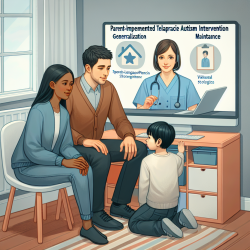As a special education director, staying informed about the latest research and advancements in therapy techniques is crucial. A recent study titled "Examining Change in the Frequency of Adaptive Actions as a Mediator of Treatment Outcomes in Internet-Delivered Therapy for Depression and Anxiety" provides valuable insights into how adaptive actions can enhance the effectiveness of online therapy. This blog will summarize key findings and offer practical tips for practitioners looking to improve their skills and outcomes.
Key Findings from the Study
The study, conducted by Bisby et al. (2022), explored the relationship between adaptive actions and psychological distress among adults receiving Internet-delivered therapy. The researchers used the Things You Do Questionnaire—21 item (TYDQ-21) to measure the frequency of adaptive actions such as healthy thinking, meaningful activities, goals and plans, healthy habits, and social connections.
Here are the main takeaways:
- Increase in Adaptive Actions: Participants reported a 29% increase in adaptive actions from pre- to post-treatment.
- Reduction in Symptoms: Both depression and anxiety symptoms significantly decreased, with a 33% reduction in depressive symptoms and a 40% reduction in anxiety symptoms.
- Therapist Support: The study found no significant difference in treatment outcomes between those who received regular therapist support and those who received optional support.
- Mediation Effect: Some adaptive actions, particularly healthy thinking, meaningful activities, and goals and plans, mediated the reduction in depressive symptoms but not anxiety symptoms.
Practical Tips for Practitioners
Based on these findings, here are some practical tips for practitioners:
- Encourage Adaptive Actions: Regularly encourage clients to engage in adaptive actions such as healthy thinking and meaningful activities. Use tools like the TYDQ-21 to track their progress.
- Flexible Support: Offer both regular and optional therapist support based on the client's needs and preferences. This flexibility can help maintain engagement and improve outcomes.
- Focus on Depression: Pay special attention to increasing adaptive actions in clients with depressive symptoms, as these actions have shown a stronger mediating effect on depression reduction.
- Continuous Learning: Stay updated with the latest research and techniques in online therapy. Attend webinars, read publications, and participate in conferences to enhance your skills.
Implementing these strategies can help you provide more effective online therapy and improve outcomes for your clients. For more detailed information and to read the original research paper, please follow this link: Examining Change in the Frequency of Adaptive Actions as a Mediator of Treatment Outcomes in Internet-Delivered Therapy for Depression and Anxiety.










